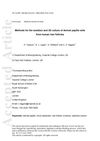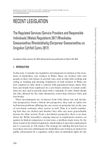 March 2025 in “Expert Opinion on Drug Discovery”
March 2025 in “Expert Opinion on Drug Discovery” New drug strategies are needed for better hair loss treatments.
 December 2024 in “Journal of Medicinal Chemistry”
December 2024 in “Journal of Medicinal Chemistry” A new topical treatment for hair loss shows promise by targeting androgen receptors.
 October 2024 in “Biology”
October 2024 in “Biology” Dermal papilla cells can help regrow hair and are promising for hair loss treatments.
 June 2024 in “Skin Health and Disease”
June 2024 in “Skin Health and Disease” Men with alopecia often feel less confident and have lower wellbeing, needing more support.
 April 2024 in “Nano research”
April 2024 in “Nano research” Minoxidil patches and cold plasma may help treat hair loss.
![Discovery of (2S)-N-(6-Cyano-5-(Trifluoromethyl)Pyridin-3-Yl)-3-(6-(4-Cyanophenyl)-3,6-Diazabicyclo[3.1.1]Heptan-3-Yl)-2-Hydroxy-2-Methylpropanamide as a Highly Potent and Selective Topical Androgen Receptor Antagonist for Androgenetic Alopecia Treatment](/images/research/693e7bf6-2325-4ddc-a20f-3470db9f4516/small/25627.jpg) December 2023 in “Journal of Medicinal Chemistry”
December 2023 in “Journal of Medicinal Chemistry” A new topical treatment for hair loss shows strong hair growth effects with low toxicity.

There are many treatments for common hair loss, but more trials are needed to decide which are best.
 2 citations
,
January 2023 in “International Journal of Biological Sciences”
2 citations
,
January 2023 in “International Journal of Biological Sciences” A specific pathway involving AR, miR-221, and IGF-1 plays a key role in causing common hair loss.
November 2022 in “Molecular Pharmaceutics” cp-asiAR may effectively treat androgenetic alopecia by promoting hair growth and reducing androgen receptor activity.
2 citations
,
September 2022 in “American Journal of Clinical Dermatology”  38 citations
,
July 2021 in “ACS Nano”
38 citations
,
July 2021 in “ACS Nano” Microneedles help treat hair loss by improving hair surroundings and promoting growth.
15 citations
,
July 2021 in “JAMA Dermatology” Androgenetic alopecia negatively affects quality of life and self-esteem, especially in women, but not depression.
 30 citations
,
April 2021 in “Journal of The American Academy of Dermatology”
30 citations
,
April 2021 in “Journal of The American Academy of Dermatology” Hair transplantation can effectively restore hair in balding areas.
 23 citations
,
January 2021 in “Biomedicine & Pharmacotherapy”
23 citations
,
January 2021 in “Biomedicine & Pharmacotherapy” DHT stops hair regrowth in mice, similar to human hair loss.
 65 citations
,
July 2020 in “Science Advances”
65 citations
,
July 2020 in “Science Advances” Dermal exosomes with miR-218-5p boost hair growth by controlling β-catenin signaling.
 55 citations
,
April 2017 in “Experimental Dermatology”
55 citations
,
April 2017 in “Experimental Dermatology” The document describes a way to isolate and grow human hair follicle cells in 3D to help study hair growth.
20 citations
,
January 2017 in “Experimental Dermatology” Igf1r helps regulate hair growth cycles.
 53 citations
,
March 2014 in “Growth Hormone & IGF Research”
53 citations
,
March 2014 in “Growth Hormone & IGF Research” IGF-1 injections help mice grow more hair by increasing cell growth and blocking a hair growth inhibitor.
 27 citations
,
February 2014 in “Experimental Dermatology”
27 citations
,
February 2014 in “Experimental Dermatology” IGF-1 affects hair loss and could be a potential treatment.





![Discovery of (2S)-N-(6-Cyano-5-(Trifluoromethyl)Pyridin-3-Yl)-3-(6-(4-Cyanophenyl)-3,6-Diazabicyclo[3.1.1]Heptan-3-Yl)-2-Hydroxy-2-Methylpropanamide as a Highly Potent and Selective Topical Androgen Receptor Antagonist for Androgenetic Alopecia Treatment](/images/research/693e7bf6-2325-4ddc-a20f-3470db9f4516/small/25627.jpg)











